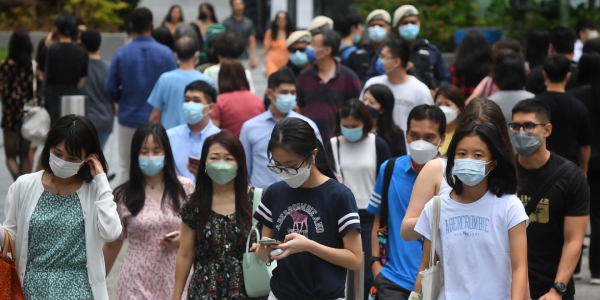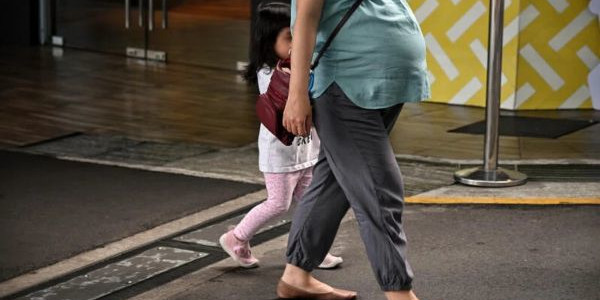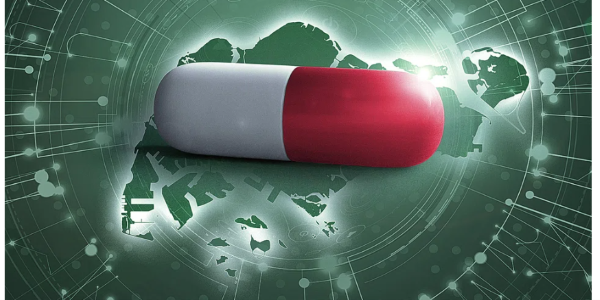A*STAR NEWS
FEATURES
How Singapore Punches Above Its Weight In Advancing Drug Discovery And Development
By Dr Hao Weidong, Chief Scientific Officer, Experimental Drug Development Centre

This image was generated with the assistance of AI.
- The Singapore government's long-term commitment to building the biomedical science ecosystem is not only yielding results for the economy, but enabling strategic business partnerships, talent attraction and innovative breakthroughs in drug discovery.
When I was presented with the opportunity to work in Singapore, I was very impressed by the high-impact publications by researchers from the various biomedical research institutes here. What ultimately pushed me to make the move to Singapore was the exciting opportunity to work across various biomedical research institutes in the ecosystem and the chance to participate in Singapore's concerted translational efforts to advance drug discovery and development. My brother, who had worked and lived in Singapore for several years, also strongly encouraged me to take up this offer.
Promising outlook for biotech in Singapore
Over the last three decades, the Singapore government has sustained investments in research, innovation, and enterprise (RIE), with the RIE2025 plan dedicating about S$25 billion to research and development (R&D). An additional S$3 billion will be injected this year to deepen capabilities in new growth areas 1.
Singapore's R&D efforts have yielded positive societal outcomes and economic growth. In 2021, there were more than 25,000 people working in the field, many of whom had high-paying and high-value jobs. This strong collaboration among ecosystem players in striving towards a common goal was one of the key reasons that attracted me to Singapore.
Based on a report by global strategy firm LEK Consulting, the number of Singapore-based biotechnology companies grew substantially from 7 in 2012 to 52 in 2022, with this number projected to increase by over 61.5 percent between 2022 and 2032. Looking at the venture funding landscape, DealStreetAsia and Enterprise Singapore reported that start-ups in the healthcare sector closed 67 deals with a cumulative value of US$0.97 billion in the past two years, despite the recent global downturn in biotech investments.
Advancements have fluctuated during the past two decades; various regions around the world have attempted to create biotech hubs with varying levels of success. But towards the end of 2023, Singapore saw an increase in investor interest and new biotech incubators launched. For instance, in November, Flagship Pioneering announced the opening of a regional hub in Singapore for expansion in the Asia-Pacific region.
While Singapore's biotech achievements may seem small in comparison to other regions in the world, I believe Singapore is in a good position to punch above its weight. What sets Singapore apart is its geographical location in the heart of Asia, its long-term commitment to invest in R&D and talent, and its strong belief in meaningful partnerships and synergistic collaborations.
Drawing on collective strengths
Singapore overcomes the constraints of its size by combining efforts and working with partners to draw on collective strengths. It is no different in the biotech space: research institutes, universities, hospitals, MNCs, startups and government agencies like the Agency for Science, Technology and Research (A*STAR) work in unison towards a common goal.
To foster the growth of biotech and deep-tech start-ups in general, several incubator spaces have been set up in Singapore. For example, A*StartCentral (A*SC) was championed by A*STAR to provide space, mentorship, and funding to support A*STAR spin-offs and external start-ups. A*SC has supported around 140 start-ups, half of which are biotechs. Between 2016 and 2022, the startups incubated there had raised more than S$950 million in funding. In my opinion, these are significant figures given Singapore's size.
Several incubators have also emerged from synergistic collaborations in recent years. A tripartite alliance between Nanyang Technological University (NTU), A*STAR, and the National Healthcare Group gave birth to co11ab, a biomedtech incubator embedded in the Lee Kong Chian School of Medicine at NTU, situated near healthcare institutions such as hospitals.
Furthermore, Singapore has drawn the attention of international collaborators. In September last year, Johnson & Johnson partnered the Singapore Economic Development Board to set up JLABS, which helps early-stage biotechs in Singapore translate their research into solutions. A month after, global life science company Evotec SE partnered both local and global venture capitals to launch 65LAB, which supports biotechs in achieving commercial success and creating positive patient impact.
I experience this spirit of collaboration keenly in my role as the Chief Scientific Officer of the Experimental Drug Development Centre (EDDC). EDDC is a national platform for drug discovery and development. We work closely with many partners to translate publicly funded local research into commercialised drugs.
This includes out-licensing drug candidates developed with our partners in Singapore's ecosystem to foreign biotechs and big pharma. Our pipeline includes small molecules and biologics that span various diseases, including oncology, fibrosis, infectious diseases, ophthalmology, and autoimmune diseases like lupus. To this end, I highlight some key success stories.
We have out-licensed a panel of cancer-specific antibodies—a product of the close multi-institutional collaboration between A*STAR, EDDC, and the Singapore Gastric Cancer Consortium—to Boehringer Ingelheim. Under the global licensing agreement, Boehringer Ingelheim will advance the preclinical and clinical development as well as the commercialisation of these antibodies. We have also collaborated with NTU on compounds against multidrug-resistant tuberculosis, which were licensed to US-based Neuro-Horizon Pharma for commercialisation.
EDDC has also played an instrumental role in helping local biotechs grow. In 2018, we out-licensed the cancer drug ETC-206, developed at EDDC, to Singapore biotech AUM Biosciences. The company went on to raise US$27 million to fund their research and has partnered big pharma MSD and Roche to run clinical trials.
EDDC itself sponsors and oversees clinical trials that it initiates. Singapore achieved a major milestone in 2023 with EBC-129, the first made-in-Singapore antibody-drug conjugate (ADC) that was made possible by the collaborative efforts of EDDC, A*STAR research institutes, and the National Cancer Centre Singapore. EBC-129 has been approved by the US Food and Drug Administration to enter first-in-human clinical trials for solid tumours.
Well-positioned for Asian-centered research
Situated at the heart of Southeast Asia, Singapore's central location fosters a melting pot of diverse ethnicities, making it an ideal hub for collecting and researching data on the varied DNA and genomes that constitute the Asian phenotype. The racial diversity of Singapore's population—which mainly comprises Chinese, Malays, and Indians—allows us to capture Asia's genetic diversity effectively.
Singapore has invested significantly in large-scale and longitudinal studies to develop well-characterised and deeply phenotyped datasets. In the era of precision medicine, these datasets provide valuable information on the Asian population and fill in the knowledge gaps of existing datasets that are often Euro-centric. This is important as Asian populations often have differing disease phenotypes from Western populations for conditions such as cardiovascular (CV) disease and cancer. Our datasets can thus be leveraged to discover biomarkers for better diagnostics and patient stratification, as well as drug targets for more precise therapeutic interventions.
One of Singapore's most ambitious initiatives in this space is Precision Health Research Singapore (PRECISE) – a central entity implementing Singapore's National Precision Medicine Strategy across government, research and health clusters and private industries. The genomes of 100,000 Singaporeans are being sequenced with the goal of creating an Asian reference genome that addresses the underrepresentation of Southeast Asian populations in existing genomic datasets. PRECISE has also put in place robust data governance measures to ensure data privacy and protection.
Singapore has also created the Asian neTwork for Translational Research and Cardiovascular Trials (ATTRaCT), which uses genetic, clinical, and imaging data from an existing study on heart failure that spans 11 countries in Asia. The ATTRaCT platform integrates top expertise in cardiovascular clinical and biomedical sciences across the nation, bringing together A*STAR research institutes, with Singapore's national heart institutions as well as academic institutions.
The robust dataset includes longitudinal follow-ups on patient outcomes as well as community-based controls. ATTRaCT will provide valuable insights to guide R&D on cardiovascular disease progression, enabling the discovery of new drug targets and drug repurposing to improve clinical strategies for Asian patients with heart failure.
Commitment to build up R&D and nurture talent
As the saying goes: 积土成山,风雨兴焉;积水成渊,蛟龙生焉. For any industry at its nascent stage, significant funding is needed to nurture growth so that the industry can become self-sustaining. I believe the Singapore government has done well in this regard by providing substantial public funding to build up R&D and nurture talent.
In terms of infrastructure, Singapore has created Biopolis and Fusionopolis — R&D hubs that bring together biomedical and science & engineering capabilities to seed new areas of research and business. Housing EDDC, and many of A*STAR's research institutes, the precinct is a fertile ground for inter-disciplinary collaborations to foster innovation, and support public and private organisations embarking on end-to-end business activities.
Singapore also prioritises talent development. A*STAR offers academic scholarships to train scientific talent who will eventually contribute to Singapore. Other efforts include the Singapore Biodesign (SB) Innovation Fellowship Programme (IFP). The SB fellowship focuses on entrepreneurial talent in the health technology sector, while the IFP targets mid-career professionals who wish to develop technology commercialisation skills. Overall, these talent development efforts help provide skilled labour for Singapore's R&D ecosystem.
A promising trajectory
Looking forward, I have a bullish outlook on Singapore's biomedical sector. The government has long-term committed investments in the sector. Moreover, the nation's conducive business environment and favourable government policies are attracting biopharma companies and venture firms, including Chinese companies and firms, which are considering Singapore for its strategic position in Asia. More and more businesses setting up shop in Singapore bodes well for the sector's growth and future.
In addition to seeing Singapore become a regional biomedical hub, I hope to witness the successful commercial launch of more made-in-Singapore biopharmaceutical products by Singapore-based entities in the coming years. With more of such accomplishments, we can then truly say that we have ushered in Singapore's biotech era.
For this to happen, I believe local stakeholders should continue to work collaboratively to build up our drug discovery and development capabilities within the ecosystem, leverage technologies such as automation and AI, and forge strategic partnerships with global multinational corporations, to further Singapore's translation of innovative research to novel drug candidates and viable therapeutics.
Was the article helpful?
A*STAR celebrates International Women's Day

From groundbreaking discoveries to cutting-edge research, our researchers are empowering the next generation of female science, technology, engineering and mathematics (STEM) leaders.
Get inspired by our #WomeninSTEM




